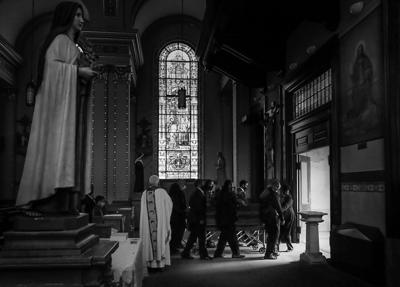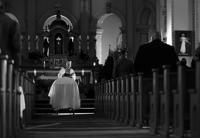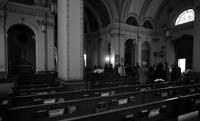In a church without electricity, Deacon John sings his brother home: ‘There was a beauty to it’

PHOTO BY DAVID GRUNFELD DIRECTOR OF PHOTOGRAPH
In the still and silent church, Deacon John Moore’s voice cut through sunlight and shadows.
“One of these mornings, I’m going away,” the New Orleans rhythm & blues legend sang, “Any day now, I’m going to heaven to stay.”
Moore has performed “Any Day Now,” a spiritual popularized by Sam Cooke & the Soul Stirrers, at countless funerals, including Allen Toussaint’s and Dr. John’s.
But on Oct. 30, under extraordinary circumstances, he sang it for his brother.
The casket inside Mater Dolorosa Catholic Church held the body of Anthony Peter Moore Sr., one of Deacon John’s younger brothers. Anthony, who hailed from a family of 13 children, had seven children of his own.
As they planned their father’s funeral, they anticipated complications from the coronavirus pandemic. They did not anticipate a hurricane and power outage.
When they gathered two days after Hurricane Zeta to commemorate and celebrate their father, Mater Dolorosa still didn’t have power.
To Monsignor John Cisewski, the scene and resolve were reminiscent of candlelit services he conducted after Hurricane Katrina.
“People always measure up,” he said. “You think they might be upset, but they know what’s happening.”
Cisewski, a friend of the Moore family for 40 years, had watched Anthony’s kids grow up.
“They had worked so hard on his funeral,” he said. “It didn’t come to be” as they originally envisioned.
“But you carry on.”
****
Anthony Moore Sr. was the ninth of 13 children. He and his siblings were raised in a devoutly Roman Catholic household. A sister, Augustine, became a nun. As a teenager, Anthony attended the Epiphany Apostolic seminary in New York. He earned a degree, only to decide not to enter the priesthood.
“He wanted to have children,” Deacon John said. “And he couldn’t do that and be a priest, too.”
After being drafted into the Army, Anthony served in the Vietnam War. He returned home and graduated from the University of New Orleans with an English degree.
He wrote poetry and short stories. His late brother Raymond taught him how to play classical guitar. Another brother, Charles, is also a classical guitarist.
Classical guitar “runs in the family,” Deacon John said. “Everybody but me — I’m a blues man.”

PHOTO BY DAVID GRUNFELD DIRECTOR OF PHOTOGRAPHY
Anthony and his wife, Louise, were married at the now-shuttered St. Monica Catholic Church, and raised seven kids. Anthony supported his close-knit family on a civil servant’s salary, working in City Hall for the Department of Property Management and, later, for the Sewerage and Water Board.
He was also active in the church communities at St. Monica, St. Matthias and Mater Dolorosa.
“He had a lot of friends in religion and politics,” Deacon John said. “He had a pretty full life. He loved to dance and party and drink and have a good time.”
But he also endured unspeakable tragedy.
His eldest daughter, Christine Moore, was a graduate student at Louisiana State University when she disappeared in Baton Rouge in May 2002. Her remains were found the next month. Circumstantial evidence, the family believed, indicated she was a victim of convicted serial killer Derrick Todd Lee, even though he wasn’t charged with her murder.
Her parents were devastated. Seven years later, Louise died. The dual losses “made a huge impact on Tony,” Cisewski said.
During the Vietnam War, he was exposed to Agent Orange. More recently, he suffered a litany of cascading health issues, including cirrhosis, chronic back pain, edema and infections. “It was horrible,” Deacon John said. “He kept going down slow.”
His children helped manage his care. He wound up at the New Orleans Veterans Administration Hospital, where he died Oct. 22. He was 72.
His family scheduled a visitation and funeral Mass eight days later at Mater Dolorosa. They asked Cisewski, who is now assigned to St. Katharine Drexel Catholic Church, to serve as celebrant.
Meanwhile, they watched as Hurricane Zeta crossed the Yucatán Peninsula into the Gulf of Mexico and took aim at New Orleans. It made landfall as a strong Category 2 storm two days before the funeral, knocking out power across most of the city, including at Mater Dolorosa on South Carrollton Avenue.
“We didn’t know a hurricane would hit in the middle of everything,” Deacon John said. “And then the lights go out on top of that. We thought it would come back on for when the funeral service was planned. It didn’t.”
The family, some of whom had traveled from out of town, decided to go ahead with the service anyway.

PHOTO BY DAVID GRUNFELD DIRECTOR OF PHOTOGRAPHY
And so on the morning of Oct. 30, family members and a few close friends gathered under the soaring ceiling of Mater Dolorosa. Sunlight filtered through the stained glass windows. Candles flickered on the altar. The church doors were thrown open to admit additional light and, mercifully, cool air.
“If it had been 95 degrees, it would have been a different experience,” Cisewski said. “But the Lord gave the city comfortable weather.”
During the visitation, Anthony’s children took turns recounting their favorite memories. “They did a fine job,” Cisewski said. “The sound was not great and you couldn’t see their faces, but everybody knew what was taking place.”
Anthony’s daughter Kathleen, who spent years as a vocalist in Deacon John’s band and is now with the World War II Museum’s Victory Belles vocal group, broke down. She took her father’s death “really hard,” Deacon John said.
But during the funeral Mass, she rallied to sing “Pie Jesus” (“Holy Jesus”). “I don’t know how she managed to sing, but she did,” Deacon John said. “And she sang it in Latin, too.”
With no electricity, microphones didn’t work, and only acoustic instruments — piano, violin, guitar — could be played.
“It was more solemn and sacred without interference from technology,” Deacon John said. “It seemed more special to me.”
Decades ago, he sang at Anthony and Louise’s wedding reception. The first time he ever sang at Mater Dolorosa was for a wedding just ahead of a hurricane; last week, he sang at a funeral just after a hurricane.
He chose the spiritual “Any Day Now” — not to be confused with the Burt Bacharach composition of the same name that Elvis Presley, Ronnie Milsap and many others covered — as a sort of hymn for Anthony.
“I thought the lyrics were very appropriate. He’s going home to be with his wife and daughter, and our mother and father.”
In the quiet of Mater Dolorosa, his unamplified voice resonated.
“That church was built for acoustic,” he said. “When it was built, they hadn’t invented microphones. And I’ve got a loud voice, so everybody could hear me.”
Cisewski appreciated the unplugged nature of the funeral.
“There was a beauty to it, no doubt about it,” he said. “The little bit of light that shadowed through the church from the candles, and the seriousness and beauty of the moment, were totally aligned. The shadows added nicely to the prayers.”
After leaving the church, there was one more river to cross: According to Deacon John, the staff at Mount Olivet Cemetery thought the funeral had been canceled. A message was quickly conveyed: “Y’all need to open up, because we’re coming over.”
The day had seemed bedeviled: A pandemic. A hurricane. A power outage. Moore’s children “were getting hit from the left and the right, and nothing was working perfectly well,” Cisewski said. “But they stuck with it, and we buried Tony.”
He was laid to rest alongside Louise and Christine. “Nothing in the world,” Deacon John said, “can stop God’s will.”

